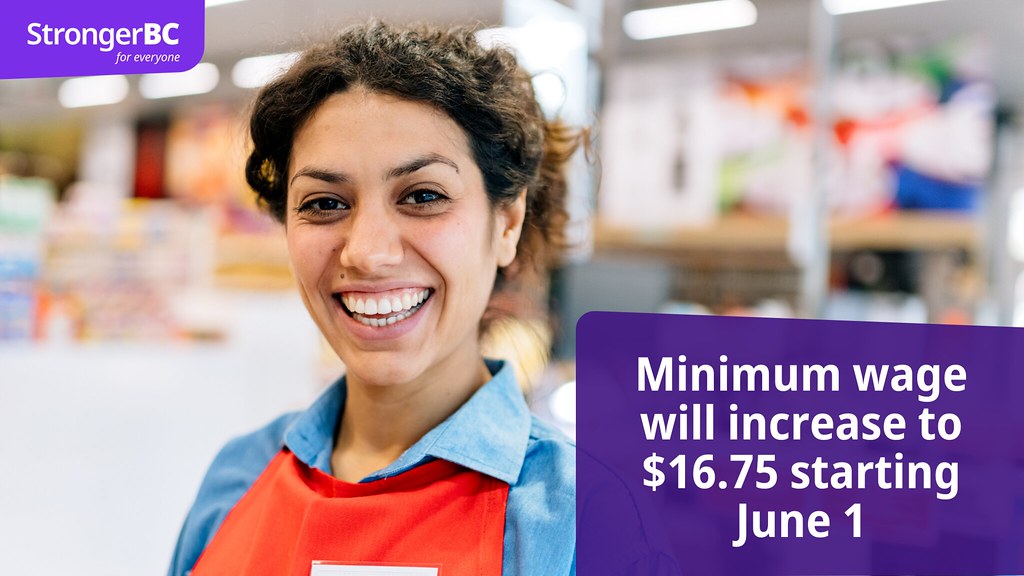DESIBUZZCanada
Events Listings
Dummy Post

International Day Of Yoga To Be Virtually Celebrated Saturday At 4pm

CANCELLED: Coronavirus Fears Kills Surrey’s Vaisakhi Day Parade

ADVERTISE WITH US: DESIBUZZCanada Is The Most Read South Asian Publication Online

SURREY LIBRARIES: Get Technology Help At Surrey Libraries

WALLY OPPAL: Surrey Police Transition Update On Feb. 26

GONE ARE THE DAYS - Feature Documentary Trailer

Technology Help At Surrey Libraries

Birding Walks

Plea Poetry/short Story : Youth Contest

International Folk Dancing Drop-in Sessions
BC Minimum Wage Increasing 6.9 Percent To $16.75 An Hour On June 1
- April 14, 2023

BC government announced this week that on June 1, 2023, B.C.'s lowest-paid workers will get a pay raise with the general minimum wage increasing from $15.65 to $16.75 an hour. "Having a minimum wage that keeps up with inflation is a key step to prevent the lowest paid workers from falling behind," said Harry Bains, Minister of Labour. "These workers and their families feel the impacts of high costs much more than anyone else. We are maintaining our policy of tying the minimum wage to inflation." The 6.9% increase in minimum wage rates reflects B.C.'s average annual inflation rate in 2022.
By PD Raj – Senior Writer DESIBUZZCanada
VICTORIA – BC government announced this week that on June 1, 2023, B.C.'s lowest-paid workers will get a pay raise with the general minimum wage increasing from $15.65 to $16.75 an hour.
"Having a minimum wage that keeps up with inflation is a key step to prevent the lowest paid workers from falling behind," said Harry Bains, Minister of Labour. "These workers and their families feel the impacts of high costs much more than anyone else. We are maintaining our policy of tying the minimum wage to inflation."
The 6.9% increase in minimum wage rates reflects B.C.'s average annual inflation rate in 2022. The adjustment reflects government's commitment to tie annual minimum wage increases to inflation. The same increase will apply to wages for residential caretakers, live-in home-support workers and camp leaders. On Jan. 1, 2024, piece rates for 15 hand-harvested crops will also increase by 6.9%.
"Elevating the minimum wage is a necessary response to inflation. The inflation we are experiencing now in B.C. is driven by profits, not wages," said Jim Stanford, director, Centre for Future Work. "It is unfair to expect the most vulnerable workers to give up some of their non-discretionary income because of record high inflation. By ensuring fairer compensation for our lowest-paid workers, we will reduce inequality and foster a more inclusive society."

The increase will positively affect approximately 150,000 workers who earn less than $16.75. Many are food service staff, grocery store workers, retail workers and others who were essential workers during the pandemic.
"Until recently, I worked for many years for minimum wage and the increases over the past five years made a big difference to me and my community. A lot of my friends and co-workers are still making minimum wage and I guarantee this increase will make a huge difference for them, especially with the basics like food and rent that are increasing along with inflation," said Marissa Iacobucci, private liquor store employee.
Government has made regular, gradual increases to the minimum wage to provide certainty for workers and predictability for businesses. Overall, B.C.'s minimum wage has increased from one of the lowest in the country to one of the highest. The minimum wage was $10.45 per hour in 2015.
Surrey Board of Trade said BC minimum wage increase of 6.9% will lead to unsustainable costs for businesses
“The Surrey Board of Trade is disappointed that such a significant minimum wage increase was announced today, leading to further unsustainable cost increases for businesses,” said Anita Huberman, President & CEO, Surrey Board of Trade. “Such a significant increase in minimum wage should have been discussed last year with the business community, especially in the face of other unprecedented increases in taxes and fees from other levels of government.”
“It is imperative that the BC Government focus on reducing costs to businesses by committing to convening a commission to review taxes and red tape impacting businesses.”
BCFED Secretary-Treasurer Hermender Singh Kailley commended the government for tying the minimum wage to inflation.
“Kevin Falcon’s Liberals froze the minimum wage for a decade and never caught up, letting workers fall further and further behind — the same workers who could afford it least,” he said.
He added the increase will be especially helpful for racialized workers, Indigenous workers and women, who disproportionately work in low-income positions.
“Every extra cent makes a difference to minimum-wage earners. Inflation has hit necessities like groceries especially hard, so it’s heartening to see our government act to prevent the cost of living from eroding workers’ wages,” BCFED President Sussanne Skidmore said.

“BC is one of the most expensive provinces in Canada,” she added, “so it makes sense that we continue to have the highest minimum wage of any province. But we still have a lot of work to do to close the gap between the minimum wage and the living wage,” the amount a family needs to cover basic expenses.
Skidmore urged the government to extend minimum wage protection so it covers all workers. “No matter where you are in BC, you should be able to earn a wage that can let you live and work in your community,” she said.
The BCFED’s multi-year Fight for 15 campaign united labour, community organizations and workers to make a successful case for increasing the minimum wage, culminating in BC becoming the first province with a minimum wage about $15 in 2021. Last spring, the provincial government announced it would tie the minimum wage to inflation.
Quick Facts:
* The Government of Canada announced an increase to the minimum wage for federally regulated employees from $15.55 to $16.65 on April 1, 2023.
* To date, most jurisdictions in Canada have indicated they will be increasing their minimum wage this year, except for Alberta and Nunavut.
* At least eight other jurisdictions also base their minimum wage increases on annual changes to the Consumer Price Index.
* The increase to the minimum wage is based on B.C.'s average inflation rate in 2022, which was 6.9%. This represents $1.08 or 6.9% of the current minimum wage. Rounded to the nearest nickel, as is common practice in B.C. and in other jurisdictions, the increase will be $1.10 per hour, from $15.65 to $16.75.
* In 2022, B.C. increased the minimum wage by 2.8%, which was the increase in the cost of living in the province in 2021. This is a common practice in B.C. and other jurisdictions.
BACKGROUNDER
Minimum wage in British Columbia (per hour): 2001 to present
2001: $8.00
2002-2010: no increases
2011: $8.75, then $9.50
2012: $10.25
2013: no increase
2014: no increase
2015: $10.45
2016: $10.85
2017: $11.35
2018: $12.65
2019: $13.85
2020: $14.60
2021: $15.20
2022: $15.65
June 1, 2023: $16.75


















